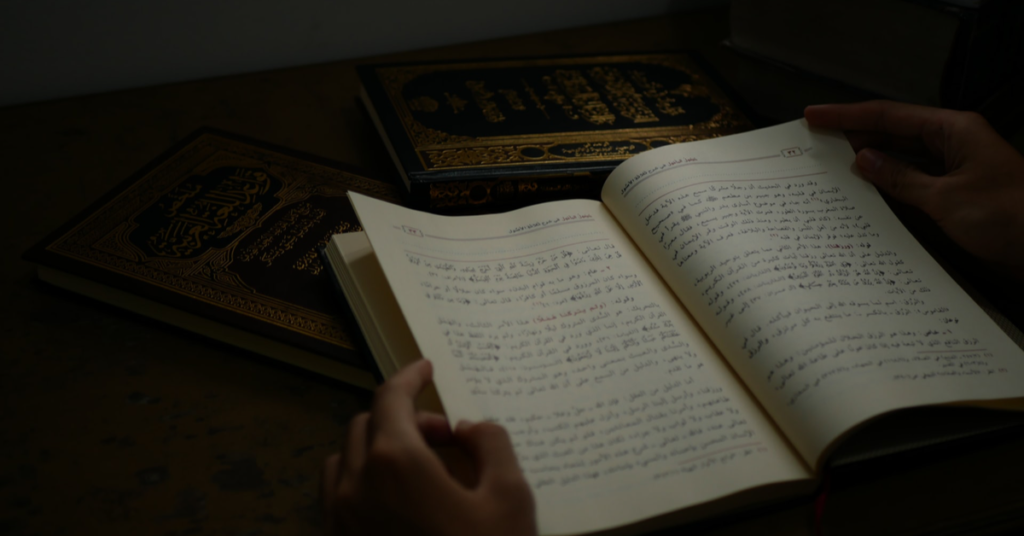What is the definition of al-ḥadīth al-musalsal (concatenated narration)?
Al-Ḥafiẓ al-ʿIrāqī states in his Alfiyyah al-Ḥadīth:
مُــسَلْـــسَـــــلُ الْحَـــدِيْــــــــــثِ مَا تَـــوَارَدَا فِيْــــــهِ الــرُّوَاةُ وَاحِـــداً فَــوَاحِـــدَ.
حَالاً لَهُمْ أوْ وَصْفاً أوْ وَصْفَ سَنَدْ كَــقَوْلِ كُلِّـــهِمْ: سَمِعْتُ فَاتَّحَـــــدْ. [1]شرح التبصرة والتذكرة للحافظ العراقي، ، جـ 2، صـ 90، العلمية، ت: الشيخ ماهر الفحل
A ḥadīth musalasal is that narration in which the chain follows a certain pattern, irrespective of what the text contains. There are various types of musalsalāt. For example, the pattern can be related to any of the following: [2]المسلسل هو ما تتابع رجال إسناده على صفة أو حالة للرواة تارة وللرواية تارة، وصفات الروات أقوال وأفعال وأنواع … المزيد
- Specific statement mentioned by every narrator. Such as the ḥadīth al-maḥabbah (the narration of love) where every narrator says: ‘I love you, so say…’ this narration is reported by Muʿādh (raḍiyAllāh ʿanhu). [3]مثال التسلسل بأحوالِ الرواةِ القوليَّة، حديثُ مُعاذ بن جَبَل رضي الله عنه، أنَّ النبيَّ ﷺ قالَ لهُ: “يا … المزيد
- Attributes of the transmitters i.e. they are all ḥanafiyyah, shāfiʿiyyah or they are from a specific city such as Damascus. [4]أو نسبتهم كأحاديث رويناها كل رجال دمشقيون، وكمسلسل الفقهاء. التقريب والتيسير للإمام النووي، صـ 87، دار الكتاب … المزيد
An example of a narration where the content is unrelated with the pattern is al-musalsal bi al-shāfiʿiyyah. In this narration, every generation has a shāfiʿī scholar. However, the text of the narration has no relation to the shāfiʿī school of jurisprudence.
عَنِ ابنِ عُمَرَ أَنَّ النَّبِيَّ ﷺ قَالَ: الـمُتَبَايِعَانِ كُلُّ وَاحِدٍ مِنهُمَا بِالخِيَارِ عَلَى صَاحِبِهِ مَالَم يَتَفَرَّقَا إِلَّا بَيعَ الخِيَارِ. [5]أخرجه البخاري، ومسلم، ,أبو داود والنسائي غيرهم
Imām al-Shāfiʿī (raḥimahullāh) narrated from Imām Mālik (raḥimahullāh) who narrated from Imām Nāfiʿ (raḥimahullāh) who narrated from Imām Ibn ʿUmar (raḥimahullāh) who reported that the Messenger of Allāh ﷺ said: “Both parties in a business transaction have a right to annul it so long as they have not separated, except in transactions which have been made subject to the right of the parties to annul them.” (Ṣaḥīḥ al-Bukhari, Ṣaḥīḥ Muslim and others)
Are all ahādīth musalsalah authentic?
Al-Ḥafiẓ al-ʿIrāqī states in his Alfiyyah al-Ḥadīth:
وَقَلَّمَا يَسْلَمُ ضَعْفاً يَحْصُلُ. [6]شرح التبصرة والتذكرة للحافظ العراقي، جـ 2، صـ 90، العلمية، ت: الشيخ ماهر الفحل
Very few narrations are free of weakness.
The grade of al-ḥadīth al-musalsal varies from being sound, fair, weak and even fabricated. [7]وعامَّة المسلسلات واهِية، وأكثرُها باطِلةٌ، لكذبِ رُواتها. وأقواها: المُسَلْسَلُ بقراءة سُورةالصَّفّ، … المزيد In some occasions, the original text of the narration is authentic in other works without the musalsal (concatenated) pattern. [8]وقلّما تسلم المسلسلاتُ من ضَعْفٍ، أعني: في وصفِ التسلسل لا في أصل المتن. شرح التبصرة والتذكرة للحافظ العراقي، … المزيد
Are the musalsal patterns always found in every generation?
Al-Ḥafiẓ al-ʿIrāqī states in his Alfiyyah al-Ḥadīth:
وَمِنْهُ ذُوْ نَقْصٍ بِقَطْعِ السِّلْسِلَهْ كَأوَّلِيَّةٍ وَبَعْضٌ وَصَلَهْ. [9]شرح التبصرة والتذكرة للحافظ العراقي، جـ 2، صـ 90، العلمية، ت: الشيخ ماهر الفحل
Some patterns reach the end of the chain i.e. the Prophet ﷺ such as al-musalsal bi al-maḥabbah. However, there are some which can stop at a specific generation such as a tābiʿī or a later scholar like Imām al-Shāfiʿī (204AH) in al-Musalsal bi al-Shāfiyʿiyyah.
Al-Ḥadīth al-Musalsal bi al-Awwaliyyah (The Concatenated-Chain of Firstness)
This is the first narration a scholar of ḥadīth narrates to his students. This tradition of firstness continues from our generation till Imām Sufyān ibn ʿUyaynah (108-198 AH) thereafter it stops. This narration is also known as ḥadīth al-raḥmah (narration of mercy).
عَنْ عَبْدِ اللَّهِ بْنِ عَمْرِو بْنِ الْعَاصِ، أَنَّ رَسُولَ اللَّهِ ﷺ، قَالَ: الرَّاحِمُونَ يَرْحَمُهُمُ الرَّحْمَنُ (تَبَارَكَ وَتَعَالَى) ارْحَمُوا مَنْ فِي الأَرْضِ يَرْحَمْكُمْ (أَوْ يَرْحَمُكٌمْ) مَنْ فِي السَّمَاءِ.
Imām Sufyān ibn ʿUyaynah said: Imām ʿAmr ibn Dīnār relates it from Abū Qābūs; the freed servant of ʿAbd Allāh ibn ʿAmr ibn ʿĀṣ who narrated this narration from the great ṣaḥābī; ʿAbd Allāh ibn ʿAmr ibn al-ʿĀṣ (May Allāh be pleased with them all) who said the Prophet ﷺ said: “Al-Raḥmān shows mercy to the merciful ones. Be merciful to those on the earth and those in the heavens will have mercy on you.” (Jiyād al-Musalsalāt and others) [10]أخرجه من غير تسلسل: الامام أحمد، والامام البخاري في الكنى، والامام أبو داود والامام الترمذي وقال حديث حسن … المزيد
Origins of this tradition:
It started when Imām Bishr ibn al-Ḥakam – he and his father al-Ḥakam both were students of Imām Sufyān ibn ʿUyaynah (108-198 AH) – took his young son Imām ʿAbd al-Raḥmān (180-260 AH) and requested if he can narrate to his son.
Imām Ibn ʿUyaynah then narrated ḥadīth al-raḥmah (narration of mercy) to him. When Imām ʿAbd al-Raḥmān (180-260 AH) started narrating ḥadīth, he began this tradition and would mention “This is the first narration I heard from Imām Sufyān ibn ʿUyaynah”. [11]قال عبد الرحمن بن بشر بن الحكم : حملني بشر بن الحكم على عاتقه في مجلس سفيان بن عيينة، فقال: يا معشر أصحاب الحديث … المزيد
The condition of narrating this ḥadith:
Shaykh ʿAbd al-Azīz al-Rājiḥī mentions: “While transmitting one must mention the chain, merely mentioning the narration will not fulfil the condition and so it will not be considered as a al-ḥadīth al-musalsal. [12]قال الشيخ الراجحي: قد وجدت بعض المسندين يكتفي بإسماع التلميذ أو المستجيز متن الحديث المسلسل بالأولية دون … المزيد Additionally, the ḥadīth must be narrated in the Arabic language.
The condition of taking this narration:
The scholars have stipulated that this narration must be the first narration one hears from their teacher. Otherwise, the condition will not be fulfilled. This is called intrinsic (ḥaqīqī). However, if one does not hear this narration first, but later on, it will be called supplementary (iḍāfī).
One such example of this is the great ḥadīth scholar Shāh Muḥammad Isḥāq al-Dehlawi from his grandfather Shāhʿ Abd al-ʿAzīz. He did not hear ḥadīth al-raḥmah with its condition i.e the first narration intrinsically (ḥaqīqī). However, he heard this ḥadīth (īḍāfī) while studying the work “Al-Faḍl al-Mubīn fī al-Musalsal min Aḥadīth al-Nabī al-Amīn” a work of Musalsalāt by Shāh Walī Allāh. This was clarified by Shaykh Abū al-Khayr ʿAṭṭār:
قال العلامة أبو الخير العطار في النفح المسكي (صـ 26 ب – 27 أ) : قوله في سند المسلسل بالأولية بأنه رواه عن مـحمد إسحاق عن جده أي لأمه الشيخ عبد العزيز الدهلوي إلخ، هذا جرى منه على المشهور بأن الشيخ مـحمد إسحاق تلقى الحديث عن جده المذكور وهو كذلك، لكن لم يرو الشيخ إسحاق عن جده حديث الأولية بشرط سلسلة الحقيقية، بل إنما سمعه على شرطه عن رجل غير مسمى ممن حضر لدى الشيخ عبد العزيز وسمع الأولية منه على شرطه. وهذه غفلة ينبغي التيقظ والانتباه لها وإنما نبهت عليها لكيلا يظن الظان أن الشيخ مـحمد إسحاق روى حديث الأولية عن جده على شرطه، نعم، قد رواه الشيخ مـحمد إسحاق على شرطه عن الشيخ عمر عبد الرسول المكي كما سنذكره.


Shāh Muḥammad Isḥāq al-Dehlawi did hear the narration with its condition from Shaykh ʿUmar ibn ʿAbd al-Karīm al-ʿAṭṭār al-Makkī who narrated from Shaykh Muḥammad Shanawāni who narrated from Shaykh Muḥammad al-Murtaḍā al-Zabīdī.
قال العلامة أبو الخير العطار: وممن روى عن الشيخ عمر ولم يسميه في الإجازة الشيخ الشمس مـحمد بن علي الشنواني الأزهري الشافعي، سمع منه المسلسل بالأولية، وقال وهو أول حديث سمعته…بروايته…والسيد محمد المرتضى الزبيدي وهو أول سمع منهما. مخطوطة النفح المسكي، صـ 142 أ.

One of the best chains which fulfil the condition in every generation till Imām Sufyān is the Moroccan chain of Shaykh ʿAbd al-Ḥayy ibn ʿAbd al-Kabīr al-Kettānī (raḥimahullāh).
Rectifying the Sanad
In the previous edition of this article, the Moroccan chain which was relied upon and deemed the highest[13]قال العلامة عبد الحي الكتاني: وهذا أعلى ما وقع لنا، إذ بيني وبين السيوطي فيه ستة وسائط وبيني وبين الميدومي فيه … المزيد by al-Shaykh ʿAbd al-Ḥayy al-Kettāni was the following:
5. Al-Shaykh Muḥammad al-Murtaḍā al-Zabīdī (1145-1205AH).
6. Al-Shaykh Dāwūd ibn Sulaymān al-Khirbatāwī (1080-1170AH)
7. Al-Shaykh Muḥammad al-Fayūmī al-Miṣrī (?)
8. Al-Shaykh Yūsuf ibn ʿAbd Allāh al-Armiyūni (d. 958AH).
However, upon further analysis of the death dates of the narrators, it seems this chain has various doubts, as follows:
- Al-Shaykh al-Khirbatāwī who was born 1080AH and al-Shaykh al-Armiyūni passed away 958AH. This would mean al-Shaykh al-Fayūmī (who is in between the previous two) lived between 958AH and 1080AH which would then mean he was over 122 years of age. Although this is possible but there seems to be no mention of al-Shaykh al-Fayūmī in other biographical works. Additionally, only al-Shaykh al-Khirbatāwī narrates from al-Shaykh al-Fayūmī and in such cases the scholars of riwāyah say:
والانفراد عن مُعمَّر مثل هذا التعمير موضع ريبة.
A sole student narrating from an extremely elderly scholar such as this raises doubts.
- Al-Imām al-Murtaḍā al-Zabīdī himself mentions in an ijāzah to Sulṭān ʿAbd al-Ḥamīd Khān that the highest chain of al-Awwaliyyah obtained by him is though his teacher al-Imām ʿUmar ibn ʿAqīl al-Saqqāf. This chain is lower by one level in comparison to the chain mentioned by al-Imām al-Kettāni.
- Although it is possible that al-Imām al-Kettāni was in possession of a specific text which proves the above as many resources was at his display. However, there are numerous cases where al-Imām al-Kettāni relies upon invalid chains as it was common amongst scholars of his time. Various scholars have written and gathered these errors. This is not to dismiss the great scholar’s caliber in the field of riwāyah.
- After consulting with some specialist scholars in the field of riwāyah such al-Shaykh Mohammed Abu Bakr Daniel and others, they have confirmed that no such text which explicitly mentions the taking of al-Fayūmī fromal-Armiyūni has been found as yet.
In summary, refraining from this chain it is best due to various doubts and lack of valid explicit text as of yet.
The full Moroccan chain (Rectified):
1. Shaykh Muḥammad Idrīs ibn Muḥammad Māḥī ibn ʿAbd al-Kabīr al-Kettānī narrated this ḥadīth to us and it is the first ḥadīth we heard from him.
2. My Uncle Shaykh ʿAbd al-Ḥayy ibnʿAbd al-Kabīr al-Kettānī (1300-1382AH) narrated this ḥadīth to us and it is the first ḥadīth we heard from him.
3. Shaykh Aḥmad al-Jamal al-Nahṭīhī al-Miṣrī al-Shāfiʿī (1260AH) narrated this ḥadīth to us and it is the first ḥadīth we heard from him.
4. Shaykh Muḥammad Aḥmad al-Bahī al-Ṭundatā’ī (d. 1260AH) narrated this ḥadīth to us and it is the first ḥadīth we heard from him.
5. Shaykh Muḥammad al-Murtaḍā al-Zabīdī (1145-1205AH) narrated this ḥadīth to us and it is the first ḥadīth we heard from him.
6. Shaykh ʿUmar ibn Aḥmad ibn ʿAqīl al-Saqqāf (1102-1171AH) narrated this ḥadīth to us and it is the first ḥadīth we heard from him.
7. My maternal grandfather Shaykh ʿAbdullāh ibn Sālim ibn Muḥammad al-Baṣrī al-Makkī (1048-1134AH) narrated this ḥadīth to me and it is the first ḥadīth we heard from him.
8. Shaykh Muḥammad ibn ʿAlā al-Dīn al-Bābalī (1000-1077AH) narrated this ḥadīth to us and it is the first ḥadīth we heard from him.
9. Shaykh al-Shihāb Aḥmad ibn Muḥammad al-Ḥanafī known as ibn al-Shalabī (around 1025AH) narrated this ḥadīth to us and it is the first ḥadīth we heard from him.
10. Shaykh Jamāl al-Dīn Yūsuf ibn Zakariyyā ibn Muḥammad al-Anṣārī (987AH) narrated this ḥadīth to us and it is the first ḥadīth we heard from him.
11. Shaykh Burhān al-Dīn Ibrāhīm ibn ʿAlī ibn Aḥmad al-Qalqashandī (831-922AH) narrated this ḥadīth to us and it is the first ḥadīth we heard from him.
12. Shaykh Aḥmad ibn Muḥammad ibn Abū Bakr al-Wasitī (745-836AH) narrated this ḥadīth to us and it is the first ḥadīth we heard from him.
13. Shaykh al-Ṣadr Muḥammad ibn Muḥammad al-Maydūmī (664-754AH) narrated this ḥadīth to us and it is the first ḥadīth we heard from him.
14. Shaykh Abū al-Faraj ʿAbd al-Laṭīf al-Ḥarrānī (587-672AH) narrated this ḥadīth to us and it is the first ḥadīth we heard from him.
15. Shaykh ʿAbd al-Raḥmān ibn ʿAli al-Jawzī (518-597AH) narrated this ḥadīth to us and it is the first ḥadīth we heard from him.
16. Shaykh Abū Sāʿīd Ismāʿīl ibn Abū Ṣālih al-Naysābūrī (452-532AH) narrated this ḥadīth to us and it is the first ḥadīth we heard from him.
17. My father Shaykh Abū Ṣāliḥ al-Naysābūrī (390-470AH) narrated this ḥadīth to us and it is the first ḥadīth we heard from him.
18. Shaykh Abū Ṭāhir Muḥammad ibn Muḥammad ibn Maḥmish al-Ziyādī (327-410AH) narrated this ḥadīth to us and it is the first ḥadīth we heard from him.
19. Shaykh Abū Ḥāmid Aḥmad ibn Muḥammad ibn Yaḥyā al-Bazzāz (d. 330AH) narrated this ḥadīth to us and it is the first ḥadīth we heard from him.
20. Shaykh ʿAbd al-Raḥmān ibn Bishr ibn al-Ḥakam (d. 260AH) narrated this ḥadīth to us and it is the first ḥadīth we heard from him.
21. Imām Sufyān ibn ʿUyaynah (107-197AH) narrated this ḥadīth to us and it is the first ḥadīth we heard from him.
22. Imām ʿAmr ibn Dīnār (126-146AH) who relates it from:
23. Abū Qābūs; the freed servant of ʿAbd Allāh ibn ʿAmr ibn ʿĀṣ who narrated this ḥadīth from:
24. The great ṣaḥābī; ʿAbd Allāh ibn ʿAmr ibn al-ʿĀṣ (may Allāh be pleased with them all) who said: The Prophet ﷺ said: ….”
Method of transmitting this ḥadith:
There are two ways one can transmit this ḥadīth. The first method is by mentioning the full chain with its text. The second manner is an abridged way where one says:
وَبِالْأَسَانِيْدِ الـمُتَّصِلَةِ إِلَى الْإِمَامِ سُفْيَانَ بْنِ عُيَيْنَةَ (وَإِلَيْهِ يَنْتهِــي التَّسَلْسُلُ) قَالَ: عَنْ عَمْرِو بْنِ دِينَارٍ، عَنْ أَبِي قَابُوسَ، عَنْ عَبْدِ اللَّهِ بْنِ عَمْرٍو (رَضِيَ اللهُ عَنْهُـمْ) قَالَ: قَالَ رَسُولُ اللَّهِ ﷺ: الرَّاحِمُونَ يَرْحَمُهُمُ الرَّحْمَنُ، ارْحـَمُوا مَنْ فِي الأَرْضِ يَرْحـَمْكُمْ (أَوْ يَرْحَـمُكُمْ) مَنْ فِي السَّمَاءِ.
With our various connected chains to Imām Sufyān ibn ʿUyaynah (to whom this musalsal pattern stops). He said: Imām ʿAmr ibn Dīnār relates it from Abū Qābūs; the freed servant of ʿAbd Allāh ibn ʿAmr ibn ʿĀṣ, who narrated this ḥadīth from the great ṣaḥābī; ʿAbd Allāh ibn ʿAmr ibn al-ʿĀṣ (May Allāh be pleased with them all) who said the Prophet of Allāh ﷺ said: “Those who have mercy, the most merciful will show mercy on them. Show mercy on those who are on the earth and those in the heavens will have mercy on you.”
The full chain (Moroccan) in Arabic:
أخبرنا شيخنا المسند الشريف مـحمد إدريس بن مـحمد الماحي بن عبد الكبير الكتاني، وهو أول حديث سمعناه منه.
حدثنا العلامة عبد الحي بن عبد الكبير الكتاني، وهو أول حديث سمعته منه، قال:
حدثنا الشهاب أحمد الجمل النهطيهي المصري، وهو أول حديث سمعته منه، قال:
حدثنا مـحمد علي البهي الطندتائي الأزهري المصري، وهو أول حديث سمعته منه، قال:
حدثنا الحافظ أبو الفيض مـحمد المرتضى الزبيدي، وهو أول حديث سمعته منه، قال:
حدثنا عمر بن عَقيل السَّقَّاف، وهو أول حديث سمعته منه،
حدثنا جدي لأمي عبد الله بن سالم بن مـحمد البصري، وهو أول حديث سمعته منه،
حدثنا مـحمد بن علاء الدين البابلي، وهو أول حديث سمعته منه،
حدثنا الشهاب أحمد بن مـحمد بن الشَّلَبي الحنفي شارح الكن، وهو أول حديث سمعته منه،
حدثنا جمال الدين يوسف بن زكريا الأنصاري، وهو أول حديث سمعته منه،
حدثنا برهان الدين إبراهيم بن علي بن أحمد القلقشندي، وهو أول حديث سمعته منه،
حدثنا الشهاب أحمد بن مـحمد أبي بكر الواسطي المقدسي، وهو أول حديث سمعته منه،
حدثناالصدر مـحمد بن مـحمد بن إبراهيم الميدومي، وهو أول حديث سمعته منه، قال:
حدثنا أبو الفرج عبد اللطيف بن عبد المنعم الحرَّانيّ، وهو أول حديث سمعته منه، قال:
حدثنا الحافظ أبو الفرج عبد الرحمن بن علي بن الجوزي، وهو أول حديث سمعته منه، قال:
حدثنا أبو سعيد إسماعيل بن أبي صالح النيسابوري، وهو أول حديث سمعته منه، قال:
حدثنا والدي أبو صالح أحمد بن عبد الملك النيسابوري، وهو أول حديث سمعته منه، قال:
حدثنا أبو طاهر محمـد بن محمـد بن مَحْمِش الزِّياديّ النيسابوري، وهو أول حديث سمعته منه، قال:
حدثنا أبو حامد أحمد بن مـحمد بن يحيى البزَّاز، وهو أول حديث سمعته منه، قال:
حدثنا عبد الرحمن بن بشر بن الحكم العَبدي، وهو أول حديث سمعته منه، قال:
حدثنا به سفيان بن عيينة، وهو أول حديث سمعته منه، وإليه ينتهي التسلسل بالأولية.
وهو عن عمرو بن دينار،
عن أبي قابوس مولى عبد الله بن عمرو بن العاص،
عن عبد الله بن عمرو بن العاص رضي الله عنهم،
عَنْ رسول الله ﷺ قال: الرَّاحِـمُـوْنَ يَرْحُـمُهُمُ الرَّحْـمَنُ (تَبَارَكَ وَتَعَالى)، ارْحَـمُوْا مَنْ فِي الأرْضِ، يَرْحَـمْكُمْ مَنْ فِي السَّمَاءِ أَوْ قَالَ: يَرْحُـمُكُمْ. [14]فهرس الفهارس ج، 1، صـ 92، دار الغرب الإسلامي
Taken from the fawā’id of our beloved teacher:
Shaykh Mohammed Daniel al-Muhājir al-Dimashqī;
Founder of Cordoba Academy.
www.cordobaacademy.com
الحاشية[+]
| ↑1 | شرح التبصرة والتذكرة للحافظ العراقي، ، جـ 2، صـ 90، العلمية، ت: الشيخ ماهر الفحل |
|---|---|
| ↑2 | المسلسل هو ما تتابع رجال إسناده على صفة أو حالة للرواة تارة وللرواية تارة، وصفات الروات أقوال وأفعال وأنواع كثيرة غيرها كمسلسل التشبيك باليد والعد فيها، وكاتفاق أسماء الرواة أو صفاتهم أو نسبتهم كأحاديث رويناها كل رجال دمشقيون، وكمسلسل الفقهاء، صفات الرواية كالمسلسل بسمعت، أو بأخبرنا، أو أخبرنا فلان والله، وأفضله ما دل على الاتصال. ومن فوائده زيادة الضبط، وقلما يسلم عن خلل في التسلسل، وقد ينقطع تسلسله في وسطه كمسلسل أول حديث سمعته على ما هو الصحيح فيه، والله أعلم. التقريب والتيسير للإمام النووي، صـ 87، دار الكتاب العربي |
| ↑3 | مثال التسلسل بأحوالِ الرواةِ القوليَّة، حديثُ مُعاذ بن جَبَل رضي الله عنه، أنَّ النبيَّ ﷺ قالَ لهُ: “يا معاذُ، إنِّي أُحبُّكَ، فَقُلْ في دُبُرِ كُلِّ صلاةٍ: اللَّهُمَّ أَعِنِّي على ذِكْرِكَ، وشُكْرِكَ، وحُسْنِ عِبَادَتِكَ”، فقد تسلسل لنا بقول كُلّ من رواتهِ: وأنا أحبُّكَ فقلْ. شرح التبصرة والتذكرة للحافظ العراقي، جـ 2، صـ 91، العلمية، ت: الشيخ ماهر الفحل |
| ↑4 | أو نسبتهم كأحاديث رويناها كل رجال دمشقيون، وكمسلسل الفقهاء. التقريب والتيسير للإمام النووي، صـ 87، دار الكتاب العربي |
| ↑5 | أخرجه البخاري، ومسلم، ,أبو داود والنسائي غيرهم |
| ↑6 | شرح التبصرة والتذكرة للحافظ العراقي، جـ 2، صـ 90، العلمية، ت: الشيخ ماهر الفحل |
| ↑7 | وعامَّة المسلسلات واهِية، وأكثرُها باطِلةٌ، لكذبِ رُواتها. وأقواها: المُسَلْسَلُ بقراءة سُورةالصَّفّ، والمسلسَلُ بالدمشقيين، والمسلسَلُ بالمصريين، والمسلسَلُ بالمحمَّدِين إلى ابن شِهاب. الموقظة للحافظ الذهبي، صـ 40، ت: الشيخ أبي غدة |
| ↑8 | وقلّما تسلم المسلسلاتُ من ضَعْفٍ، أعني: في وصفِ التسلسل لا في أصل المتن. شرح التبصرة والتذكرة للحافظ العراقي، جـ 2، صـ 95، العلمية، ت: الشيخ ماهر الفحل |
| ↑9 | شرح التبصرة والتذكرة للحافظ العراقي، جـ 2، صـ 90، العلمية، ت: الشيخ ماهر الفحل |
| ↑10 | أخرجه من غير تسلسل: الامام أحمد، والامام البخاري في الكنى، والامام أبو داود والامام الترمذي وقال حديث حسن صحيح. وأخرجه مسلسلا: الحافظ علاء الدين العطار، الحافظ ابن ناصر الدمشقي، والحافظ العراقي، والحافظ ابن حجر، والحافظ السخاوي، والحافظ السيوطي وغيرهم |
| ↑11 | قال عبد الرحمن بن بشر بن الحكم : حملني بشر بن الحكم على عاتقه في مجلس سفيان بن عيينة، فقال: يا معشر أصحاب الحديث أنا بشر بن الحكم بن حبيب النيسابوري، سمع أبي الحكم بن حبيب من سفيان بن عيينة، وقد سمعت أنا منه، وحدثت عنه بخراسان، وهذا ابني عبد الرحمن قد سمع منه. تاريخ بغداد ، جـ 11، صـ 559، دار المغرب الإسلامي، والمنتظم في تاريخ، جـ 12، صـ 161، العلمية، و تذهيب تهذيب، جـ 5، صـ 389، الفاروق |
| ↑12 | قال الشيخ الراجحي: قد وجدت بعض المسندين يكتفي بإسماع التلميذ أو المستجيز متن الحديث المسلسل بالأولية دون سنده، يظنّ ذلك كافيًا، التلميذ أنّه قد تحمّله عن شيخه بالسماع المتصل، وهذا خطأ كبير، فإنّ الحديث متنا وسندا من شيخه وأمّا إذا لم يسمع إلا المتن، فتكون روايته عن شيخه بالسماع، وشيخه عن النبي ﷺ مرسلا، وهذا منقطع، وليس بمتصل، إلا أن تكون للتلميذ إجازة من شيخه، فيرويه عنه عن شيوخه إلى النبي ﷺ بالإجازة لا السماع، فليتنبه إلى هذا، وليتأكد التلميذ من سماع شيخه الحديث بسنده ومتنه، وثم ليسمعه منه متنًا وسندًا، ثم ثم ليؤده كما سمعه، والله الموفق. هدي الساري إلى أسانيد الشيخ إسماعيل الأنصاري، صـ140-141، مكتبة الرشد |
| ↑13 | قال العلامة عبد الحي الكتاني: وهذا أعلى ما وقع لنا، إذ بيني وبين السيوطي فيه ستة وسائط وبيني وبين الميدومي فيه تسعة، وهذا أعلى ما يكون. فهرس الفهارس ج، 1، صـ 92، دار الغرب الإسلامي |
| ↑14 | فهرس الفهارس ج، 1، صـ 92، دار الغرب الإسلامي |




